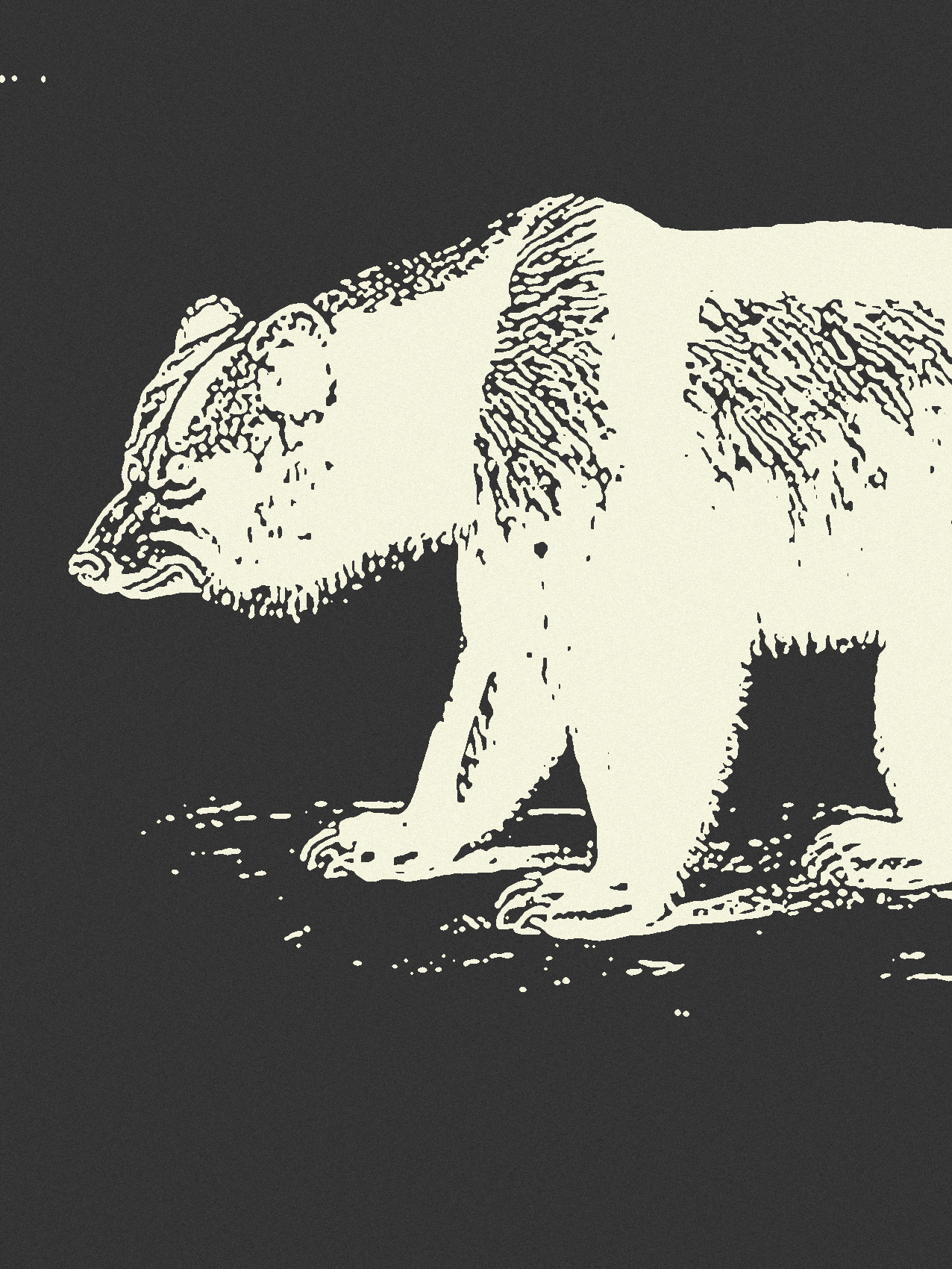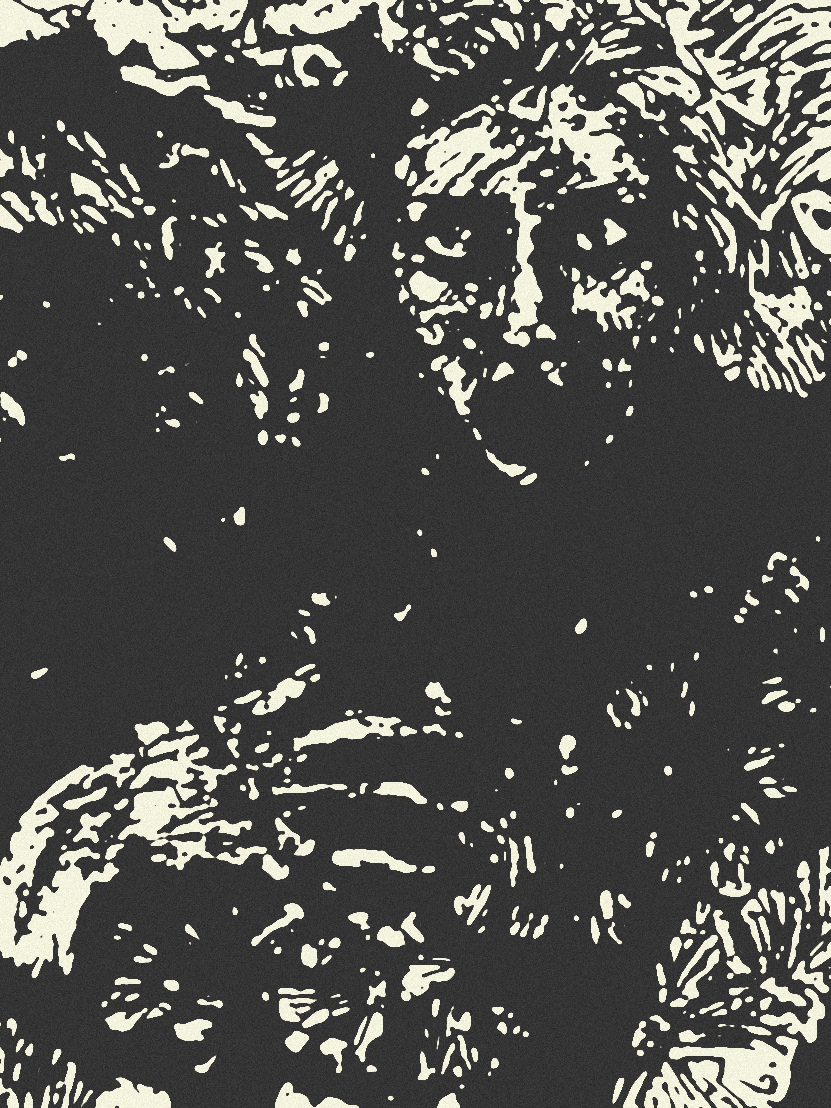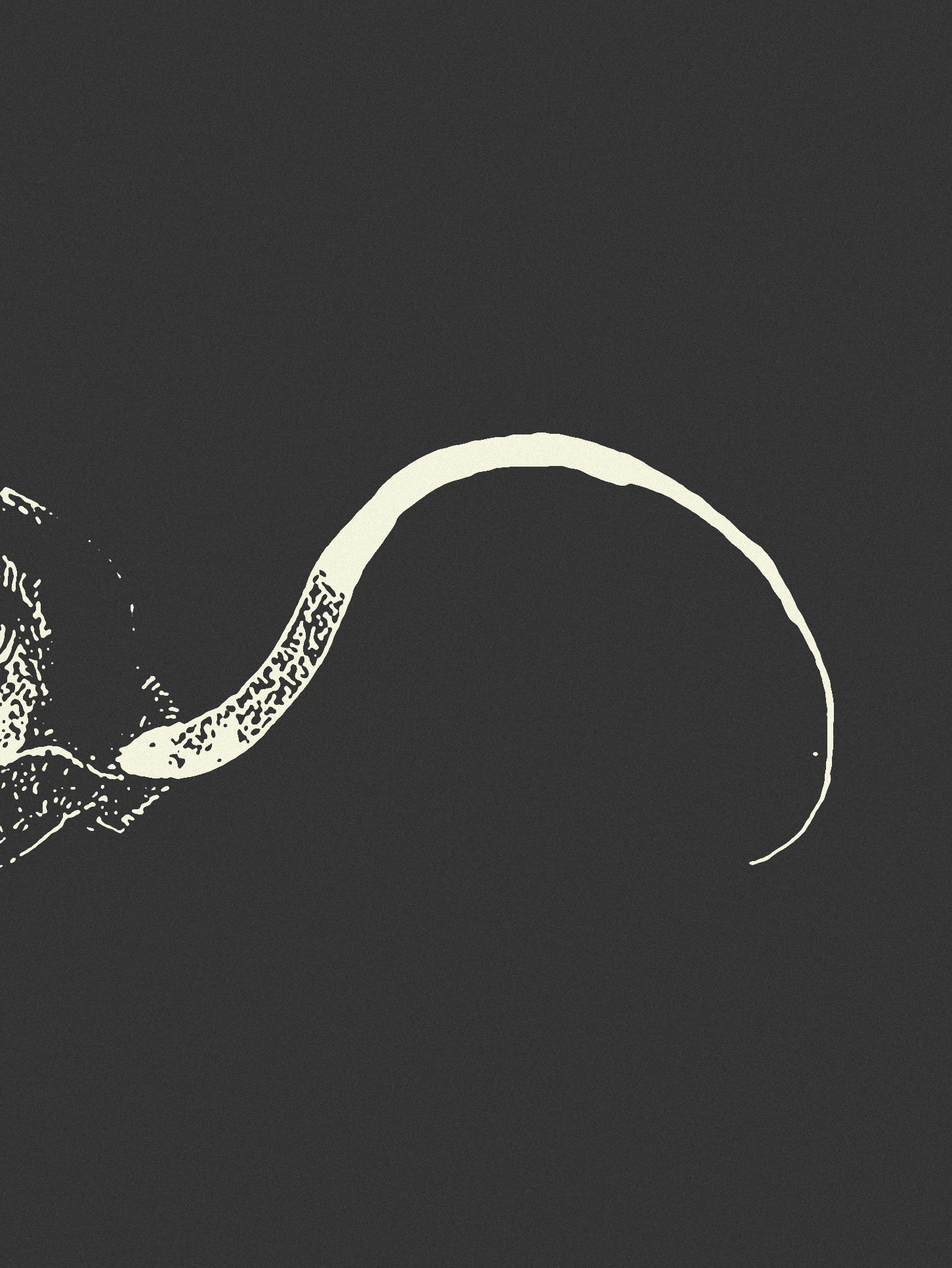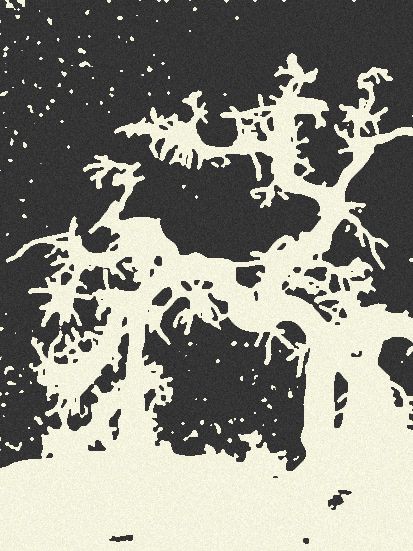• • •
Every insect pinned to Simon’s wall had been found and captured by his own hands. He guided them all through the threshold between life and death, lovingly preserving their heads, thoraxes, and wings. Eventually, he hoped, their spirits might join his celebration of their earthly bodies and appreciate how he froze them in their prime. And if they couldn’t, he hoped they at least enjoyed being chased. Desired.
After a week of hiking back and forth along the Appalachian Trail in Virginia, he captured Megalopyge opercularis, the southern flannel moth. For Trachelophorus giraffa, the giraffe weevil, he took several planes and then sailed to Madagascar, net never leaving his hands except to pass through customs. Nothing, literally nothing, could separate him from the rare and exotic insects missing from his collection.
He sorted his walls by taxonomic order: the hard bodies and horned heads of the Coleoptera on the North wall; every stage of life for the Lepidoptera, from caterpillar to winged beauty, on the East wall; Hymenoptera occupied the South wall, which he meticulously pinned to exhibit their stingers; and on the West wall, he put each tiny member of the Diptera with their single pair of wings and sucking mouths on microscopic display. And, of course, he pinned many more to the ceilings, the baseboards, the doors—all arranged again by order and even further by size and color so every surface radiated the iridescent sheen of their bodies.
In recent years, he begrudgingly accepted that his home would never be large enough to store every insect of his fancy, so he began to limit himself only to the most beautiful. Those whose bodies bore alluring shades of camouflage. Those who slid through the evolutionary line as mutants until their bodies grew strange angles and unusual textures to guarantee survival.
There was an empty spot for one such bewitching aberration, eye level in the middle of the door leading out of his collection room. The absence burned into his beady eyes every time he reached for the knob to leave. With his newly purchased tickets, he planned to finally fill it with the chiffon curves and seductive pastel streaks of the insect that flitted through his dreams at night: Hymenopus coronatus.
At five-thirty in the morning, Simon would arrive at his regional airport to catch a flight to Charlotte, where he’d then hop on a connection to Seattle-Tacoma International. He’d wait a few hours for another flight to Narita and then finally get on the last leg to Manila. From there, he’d ride a Jeepney—just for the fun of it—to a night bus terminal. He’d catch up to the new time zone with a melatonin tablet and a nap on the way to the port, where he’d finally catch a bangka to the Palawan Rainforests in the South. Then, reenergized, he’d begin the trek through the dense brush, searching for the orchids where his beauty might be hiding.
Of course, travel never goes exactly to plan. One delay leads to two, and it’s never easy to rest on the plane as hoped because of a screaming child or petulant patches of turbulence. Naturally, his checked luggage was lost to whatever beast lived in the belly of the airport—but which one he didn’t know—and so the special clothes he bought to protect himself from mosquitos and the host of diseases they carried weren’t available. It was certainly a wrench in the plans of the man who refused every vaccine offered to him since he reached legal adulthood, but it wouldn’t deter him. He was sure the locals would be able to help.
They didn’t, not as much as he’d hoped. He approached them with the same high-brow diction he used to address the insects pinned to his wall. After all, empty husks couldn’t ask him to filter academia through his tongue. He spoke to speak, not to be understood. And for the life of him, he couldn’t figure out how to be understood. So his voice got louder, and his gestures got larger to the degree that whatever his speaking partner may have been able to parse out drowned in his theatrics.
Soon, rumors of the loud foreigner advanced faster than he did, and by the time he broke off the path into town, tired and already sporting a trail of angry red whelps down his gangly legs, someone was waiting with a terse smile to lead him to the road out.
He hitched his backpack higher on his shoulder, expanded his net, and then stepped past the first line of uncut trees to begin his search.
A family of pangolins trotted by his ankles. If he were there for any Hymenoptera, he would have followed the pangolins to the ant hill their hungry eyes scanned the ground for, but he knew from experience that straying from his mission would result in total failure. Like going to the grocery hungry, he’d leave the rainforest with every insect in his cart but the one he came for. So, with the willpower only a true man of science could muster, he turned away from the pangolins and looked for the delicate petals of an orchid.
Luckily for Simon, orchids in the rainforest aren’t too difficult to spot. They can occupy all levels of the many microhabitats between the dirt and the sky. He could scan the branches above for the clinging epiphytes, check the rocks for lithophytes, or look for terrestrial stalks shooting out of the ground. On a normal day, this would be an easy task. But this wasn’t a normal day. The red bumps on his arms and legs were beginning to outnumber the chicken pox he had as a child and, perhaps it’s the heat, he thought, making his head spin.
Orchids come in as many colors and shapes as humans, and like humans, Simon favored some types of orchids over others. Some are delicate, with purple veins snaking through their pale petals—his favorite. Some are much darker, with each member of the flower’s trinity bearing a rotted purple tinge. He didn’t care much for the way the drab colors hid the beauty of the orchid’s shape, so he chose to forgo any he saw along his path in the rainforest. Besides, Hymenopus coronatus, he knew, favored the lighter petals. His excitement toward finding his favored insect only grew with the knowledge of their similarities. Finding Hymenopus coronatus would be like meeting an old friend... who he would freeze to death in a cup of ice or a freezer and then pin to his door.
No longer did he walk on anything that resembled a path nor could he distinguish between the sparse patches of dirt and piles of writhing detritus peeking through the patchwork of grass and moss on the forest floor. The spinning in his head—
Am I experiencing one of the famous Ring of Fire earthquakes?
—and the discombobulated nature of his steps carried him far off the path outlined on the chicken scratch map he drew before coming on this trip. Waxy leaves that rode the entire green color spectrum brushed against the exposed hair of his legs and—
They’re grasping my legs, damn these
—vines like rope descended from the thick canopy, dangling in his face and mocking his challenged equilibrium. The gentle sway. The way they clung to his shoulders. They goaded him into—
Swinging from Granny’s willow
—and he dropped any pretense of searching for the orchids of his fancy. His location in the rainforest was the first unknown he had encountered since he was a schoolboy, studying in his Podunk town, chasing katydids with the net his mother used like a hearse to transport dead fish from the murky water of their fish tank to the murkier water of their toilet. He climbed—
High into the apple tree
—up, up, up, until he could see his entire yard. Head tilted up, he scanned the night sky for extra—
Terrestrials.
When he’d managed to climb into a tree, he didn’t know. And how? He couldn’t walk a straight line to pass a sobriety test, let alone climb a tree, but there he was, high enough in the canopy of the rainforest to stare the vapid, gawking tourists of the Eiffel Tower in their starstruck eyes, staring down the gnarled branch of a Cinnamomum rupestre. The spicy scent tickled at his nose like—
Mother’s apple pie
—and the resulting sneeze nearly bucked him from the trunk to collapse through the canopy of branches back down to the forest floor. He held his ground with quaking arms and a sweaty forehead that he figured was greatly contributing to the tropical humidity count of this particular section of the rainforest. A bead of sweat—
Not sweet, not salty. My sodium is
—falling off his chin in a high-speed, slow-motion belly flop to the ground; bouncing off the branch below him; spattering into tiny droplets, which then fell to lower branches and so on in that decimating way until the shattered remnants of his fever smacked onto the rock bed beneath. He was close enough to them to watch the sweat pool and trickle down the crevices.
How high am I? He thought, realizing only then that his perspective had undergone a shift.
Up, he looked high into the canopy and watched the branches ascend like an elevator rushing past the floors of a grand hotel, soaring into the penthouse emergent layer at the top. The upward rush of sensation made him sick.
Down, down, down, he looked—he prayed—as he returned his gaze to the forest floor he hoped was much closer to him than he had assumed. And then he saw it:
Paphiopedilum fowliei, how bulbous you are. How warty you are. How—
Unusual, the strange orchid stared up at him. Its tuba-like mouth opened wide enough to catch the deluge of sweat rolling off his body. The green arms of its petals stretched wide, their purple hands encouraging him to jump into them like—
A trust fall. I trust you.
Simon trusted the natural far more than the man-made, so it shouldn’t have surprised him when he felt his arms loosening from the tree to do just what the orchid asked. No, he was rather excited, even as he plummeted from the tree, because in those free-falling moments when time stood still to watch him dive, he saw, through the haze of his fever, exactly what he’d been looking for.
Hymenopus coronatus.
✷
It’s cool, frigid almost. It’s so gentle it tickles—
His body convulsed under a shudder that ripped itself from the small of his back up to his head. It shook his swollen eyes open. A woman—
Not a woman, it’s—
Hymenopus coronotaus was sitting before him, her legs bent beneath her at an improbable angle. She stooped over him and wiped the sweat and blood from his brow. She leaned in close, so close that Simon could look into her dusky white eyes. So close that he could inspect her alien face for wrinkles or creases. Her skin was so smooth, so shiny that he could see his red flush reflected in her alabaster—
skin. Why am I exposed? Where is my—
shirt, gone from his undefined torso so that his flat chest and sunken belly were on full display to the beautiful creature before him. His slow eyes found it wadded up in her hand, then he felt the coarse khaki against the wound on his head. It—
hurts. I need a bandage and antiseptic to rub—
against his bare skin as she wiped him down. She continued across the gaunt planes of his face, over the edge of his defined jaw, trailing the pruritic tips of her forelegs down the thin skin veiling his carotid artery. Further down she went, slowly so that Simon’s lethargic consciousness could keep up with her. He felt her at his chest, her feathery touch taunting a new frontier of sensation he had never dared to explore before. Down—
Keep going down, please, go
—down, to the lonely trail of hair at his belly button that beckoned her, begged her, to follow it under the line of his belt. The strong pump of his heart pulsed in sync with each clink of his buckle coming undone. His wispy moans matched the opening of his pants to the woman over him. She took him in her forearms, working around the obvious mismatch of their anatomy with skill that surprised and excited him. Blood trickled down the wound in his forehead, but—
I clearly haven’t lost too much. I can still use my—
hands, that he thrust around the base of her antenna to pull her head up before she could engulf him. She evaded, instead bringing her clenching mandibles down to his skin to lay kisses across his torso, scissoring her way back up the delicate skin of his belly, up to the peaks of his chest then—
More, please keep—
going up his neck to the bend of his jaw. Leaving her prickly kisses all over his body but never approaching his lips. He was going mad, the heat in his body built to agonizing levels, and he needed to release it before it killed him. His hands, still gripping the mound of skin around her antenna, tugged at her, tried to align her mouth with his so he could—
Kiss. I need to kiss—
The appendages around her mouth sank into his cheeks, shredding through them with each contraction. His mouth opened, not in a scream but in a guttural moan pushed up from his stomach by waves of climax. In the vacuum it left, he felt her in—
my cheek. What the fuck is in my cheek? Are these
—eggs, tens of hundreds of tiny eggs flowed from her into the sore in his cheek. And then he realized, many more had already been planted all over his body, now covered in the saliva oozing from her mouth onto his open wound.
He pushed against her, but she locked onto his frail body. She spat burning gobs onto him, covering him in a sheen of her wetness, and only after thoroughly coating him in her viscous secretions did she release her grip and move away. Despite himself, his eyes followed the graceful movement of her white, willowy body. She swayed over him as though she might disappear, evaporating into the humid air with his breath. But she stayed. And she watched. She walked circles around his prone form, never taking her bulbous eyes from him. Waiting, for—
Jesus, fuck!
—her children to emerge. They burst from their eggs in rapid-fire pops like firecrackers exploding under his skin, all over his body. Out from his wounds and into the coating of spit, they pushed and swam and penetrated their protective casings to draw their first breaths of the rainforest. Replacing the taste of Simon’s blood with the heavy sweetness of humid air, they scuttled through the mess on his body and into the forest. One after the other, each new birth shredding his consciousness with his skin, they left him. His eyes began to drift shut, but he struggled against the blackness staining the edges of his vision to watch the last of his precious Hymenopus coronatus flock into the forest, determined to see them safely make the journey from his body toward an orchid to call home.
✷
When Simon didn’t reemerge from the forest, the locals set out in search of him. It took them two days of hacking through the dense vegetation to find him, still naked and covered in gaping sores. They rushed him to a doctor at the local clinic who immediately called in a Helivac transport to a large hospital in Manila. He spent three weeks undergoing various tests and being pumped full of medication he wouldn’t have consented to if he were in his right mind. By the time he realized what chemicals were coursing through his veins, he’d already finished every antiviral, anti-bacterial, and anti-fungal treatment they wanted to give him.
The trip back home was just as tiring as the first, and he never recovered his lost luggage. This time, the weight he had to drag through each terminal and declare to every stern-faced customs officer was the weight of disappointment. He wore his dismay on his pock-marked skin; it flowed through his veins with each pathetic pump of his heart.
His mind hovered in the clouds even during his layovers as he replayed every moment he spent with her. He continued to think of her as he drove home. The slam of his front door barely registered in his addled mind because all he heard was the snick of her pinchers biting at his skin.
Each morning, he woke to the trace of her roaming over his body. His scar tissue itched, and nothing he did could soothe the absence of her touch.
He did little more than eat and sleep, spending the time between staring at the empty spot on his door reserved for his Hymenopus coronatus. He stood there, still as the door itself, and scratched the scar on his cheek, remembering the euphoric way she sliced him open. Harder and harder and harder, he scratched until he was met with a pop and the gushing of blood.
He clamped his hand over the wound and ran to the bathroom as quickly as his emaciated body would allow. Standing in front of his grimy mirror, he gingerly pulled away his hand to see a tiny mantis nymph peeking through. He reached through the blood and puss to pull it out and examine its translucent white skin.
He didn’t feel pain, even when the smile overtaking his sunken face ripped the hole in his cheek even wider. Nothing registered beyond his ecstasy.
He placed the delicate creature in an old terrarium and carried it into his collection room. It would take four to six months for the nymph to mature, and during that time he would love it and nurture it like he would his own child.
But when the time came, he would put the small terrarium in his freezer, and he would leave it there until the mantis was well and truly dead. Then, he would pin it in the empty space on his door without remorse. And then, finally, he would bask in the presence of Hymenopus coronatus.
✷
Briar Hyssop is a sentient scarecrow who writes tales of horror, science fiction, and fantasy--and sometimes thought-provoking essays about how the straw fills out their overalls. Briar's work has been featured in Chill Mag and is upcoming in MicroLit Almanac and Monstrous Femme. You can find them on Instagram at @briarhyssopwrites.










